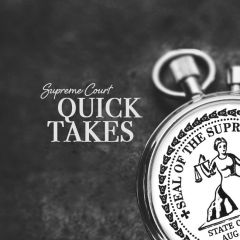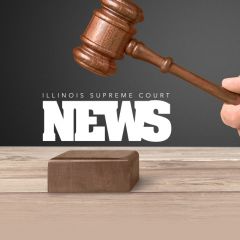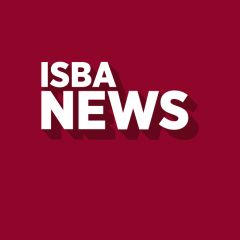The Illinois Supreme Court handed down one opinion on Wednesday, October 28. In People v. Casler, the Supreme Court reversed and remanded a defendant’s conviction for obstructing justice when he provided a false name to police.
ISBA members, sign up to receive The Bar News' biweekly e-newsletter by emailing emailpreferences@isba.org
-
October 28, 2020 | Practice News

-
October 28, 2020 | Practice News
 The Illinois Supreme Court announced this week the expansion of the Volunteer Pro Bono Program for Criminal Appeals (Program) to include the Third, Fourth, and Fifth Appellate Districts beginning on December 1, 2020.
The Illinois Supreme Court announced this week the expansion of the Volunteer Pro Bono Program for Criminal Appeals (Program) to include the Third, Fourth, and Fifth Appellate Districts beginning on December 1, 2020. -
October 28, 2020 | ISBA News
 The ISBA and the Illinois Supreme Court hosted a virtual listening tour this year to explore and collaborate on local issues across the state. Sessions were held in all five Judicial Districts.
The ISBA and the Illinois Supreme Court hosted a virtual listening tour this year to explore and collaborate on local issues across the state. Sessions were held in all five Judicial Districts. -
October 27, 2020 | Practice News
 The Illinois Supreme Court announced today two orders which were proposals from the Illinois Judicial Conference’s Court Operations During COVID-19 Task Force (Task Force). The Orders are available on the Court website by clicking here.
The Illinois Supreme Court announced today two orders which were proposals from the Illinois Judicial Conference’s Court Operations During COVID-19 Task Force (Task Force). The Orders are available on the Court website by clicking here. -
October 27, 2020 | CLE
 Join us from 2 to 3:30 p.m. on Thursday, November 12 for this online look at how the pandemic has impacted the landlord-tenant landscape, including the new requirements for rental housing, the governor’s executive order, and the new Rule 139 regarding practice and procedures in eviction proceedings that were recently issued by the Illinois Supreme Court.
Join us from 2 to 3:30 p.m. on Thursday, November 12 for this online look at how the pandemic has impacted the landlord-tenant landscape, including the new requirements for rental housing, the governor’s executive order, and the new Rule 139 regarding practice and procedures in eviction proceedings that were recently issued by the Illinois Supreme Court. -
October 26, 2020 | Practice News
 This year, legalized recreational cannabis was supposed to dominate the news in Illinois and elsewhere (other things happened). In their October Illinois Bar Journal article, “What’s That Smell?,” Emily L. Fitch and Brenda M. (Duke) Mathis revisit Illinois’ new cannabis-related laws and follow the legal issues sprouting from cannabis legalization. They conclude multiple issues remain to be clarified by legislative action and caselaw, including questions surrounding probable cause with the scent of cannabis alone and whether a free air sniff is sufficient when the dog has been trained to detect cannabis. Up to this point, Illinois courts have placed only limited restrictions on free air sniffs. However, it does appear that the reviewing courts are prepared to throw out a prosecutorial-minded approach to the free air sniff and write new caselaw in the face of cannabis legalization. Fitch and Mathis also summarize new cannabis laws and compare Illinois with other states revisiting probable-search caselaw in light of cannabis legalization.
This year, legalized recreational cannabis was supposed to dominate the news in Illinois and elsewhere (other things happened). In their October Illinois Bar Journal article, “What’s That Smell?,” Emily L. Fitch and Brenda M. (Duke) Mathis revisit Illinois’ new cannabis-related laws and follow the legal issues sprouting from cannabis legalization. They conclude multiple issues remain to be clarified by legislative action and caselaw, including questions surrounding probable cause with the scent of cannabis alone and whether a free air sniff is sufficient when the dog has been trained to detect cannabis. Up to this point, Illinois courts have placed only limited restrictions on free air sniffs. However, it does appear that the reviewing courts are prepared to throw out a prosecutorial-minded approach to the free air sniff and write new caselaw in the face of cannabis legalization. Fitch and Mathis also summarize new cannabis laws and compare Illinois with other states revisiting probable-search caselaw in light of cannabis legalization. -
October 23, 2020 | Practice News
 Chief Justice Anne M. Burke and the Illinois Supreme Court announced today the amendment of Rule 415, which will allow attorneys to provide a copy of discovery to a defendant unless good cause is shown why the discovery should not be furnished to the defendant.1 comment (Most recent October 26, 2020)
Chief Justice Anne M. Burke and the Illinois Supreme Court announced today the amendment of Rule 415, which will allow attorneys to provide a copy of discovery to a defendant unless good cause is shown why the discovery should not be furnished to the defendant.1 comment (Most recent October 26, 2020) -
October 22, 2020 |
Practice News
By Michael Bergmann, Executive Director of the Public Interest Law Initiative Coordinated by the American Bar Association’s Standing Committee on Pro Bono and Public Service, Pro Bono Week is intended to inspire even greater pro bono participation by lawyers throughout the nation. In 2020, Pro Bono Week will be celebrated from October 25-31. This initiative provides an opportunity for legal organizations across the country to collaboratively commemorate the vitally important contributions of America’s lawyers and to recruit and train the many additional volunteers required to meet the growing demand. The Standing Committee on Pro Bono and Public Service undertook this initiative to provide a format for showcasing the incredible difference that pro bono lawyers make to our nation, to our system of justice, to our communities and, most of all, to the clients they serve. For more information, visit www.celebrateprobono.org.
-
October 22, 2020 | Practice News
 The Illinois Supreme Court handed down three opinions on Thursday, October 22. In People v. Lusby, the court denied a defendant’s request for leave to file a successive post-conviction petition asserting that his sentencing hearing was constitutionally inadequate. In Tabirta v. Cummings, the court considered whether the existence of one part-time employee who services a few of a defendant corporation’s customers from his home in Cook County satisfies the “other office” or “doing business” prongs of section 2-102(a) of the venue statute. In Goral v. Dart, a split court allowed disciplined and fired Cook County correctional officers to continue their lawsuits against Cook County Sheriff Tom Dart.
The Illinois Supreme Court handed down three opinions on Thursday, October 22. In People v. Lusby, the court denied a defendant’s request for leave to file a successive post-conviction petition asserting that his sentencing hearing was constitutionally inadequate. In Tabirta v. Cummings, the court considered whether the existence of one part-time employee who services a few of a defendant corporation’s customers from his home in Cook County satisfies the “other office” or “doing business” prongs of section 2-102(a) of the venue statute. In Goral v. Dart, a split court allowed disciplined and fired Cook County correctional officers to continue their lawsuits against Cook County Sheriff Tom Dart. -
October 22, 2020 | CLE
 Join us from 1:30 until 5 p.m. on Thursday, November 5 for "Construction Law Primer for Young Attorneys and General Practitioners—Part 2." Illinois real estate enjoys robust health with continuing new residential and commercial construction, the remodeling of existing residential and commercial construction, and the improvement and construction of highways, roads, and bridges. Schools, universities, and wastewater treatment plants are also being constructed or improved. With so much ongoing construction taking place, it’s likely that Illinois practitioners will eventually be confronted with one or more construction matter. Don’t miss part two of this two-part series that examines the various issues that can arise in construction law cases and offers guidance on how to navigate these issues. Attorney with basic practice experience who attend this seminar will better understand: the basic steps for closing out of construction projects; the specialized issues, including Buy American requirements and workforce diversity requirements, that can affect construction projects; construction claims and how to process them; labor laws and prevailing wage issues that can impact a construction project; how arbitration and mediation can help your next construction law dispute; and how to identify and address the ethical issues that you may encounter throughout a construction law case.
Join us from 1:30 until 5 p.m. on Thursday, November 5 for "Construction Law Primer for Young Attorneys and General Practitioners—Part 2." Illinois real estate enjoys robust health with continuing new residential and commercial construction, the remodeling of existing residential and commercial construction, and the improvement and construction of highways, roads, and bridges. Schools, universities, and wastewater treatment plants are also being constructed or improved. With so much ongoing construction taking place, it’s likely that Illinois practitioners will eventually be confronted with one or more construction matter. Don’t miss part two of this two-part series that examines the various issues that can arise in construction law cases and offers guidance on how to navigate these issues. Attorney with basic practice experience who attend this seminar will better understand: the basic steps for closing out of construction projects; the specialized issues, including Buy American requirements and workforce diversity requirements, that can affect construction projects; construction claims and how to process them; labor laws and prevailing wage issues that can impact a construction project; how arbitration and mediation can help your next construction law dispute; and how to identify and address the ethical issues that you may encounter throughout a construction law case.

